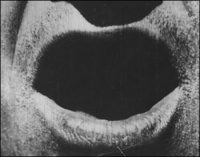Thesaurus
From The Art and Popular Culture Encyclopedia

Illustration: a close-up of a mouth in the film The Big Swallow (1901)
|
Related e |
|
Featured: |
The word thesaurus is derived from 16th century New Latin, in turn from Latin thesaurus, from ancient Greek θησαυρός thesauros, "store-house", "treasury". Besides its meaning as a treasury or storehouse, it more commonly means a listing of words with similar, related, or opposite meanings (this new meaning of thesaurus dates back to Roget's Thesaurus). For example, a book of jargon for a specialized field; or more technically a list of subject headings and cross-references used in the filing and retrieval of documents (or indeed papers, certificates, letters, cards, records, texts, files, articles, essays and perhaps even manuscripts), film, sound recordings, machine-readable media, etc.
The first example of this genre, Roget's Thesaurus, was published in 1852, having been compiled earlier, in 1805, by Peter Roget. Entries in Roget's Thesaurus are not listed alphabetically but conceptually and are a great resource for writers.
Although including synonyms and antonyms, entries in a thesaurus should not be taken as a list of them. The entries are also designed for drawing distinctions between similar words and assisting in choosing exactly the right word. Nor does a thesaurus entry define words. That work is left to the dictionary.
History
In antiquity, Philo of Byblos authored the first text that could now be called a thesaurus. In Sanskrit, the Amarakosha is a thesaurus in verse form, written in the 4th century. The first example of the modern genre, Roget's Thesaurus, was compiled in 1805 by Peter Mark Roget, and published in 1852. Entries in Roget's Thesaurus are listed conceptually rather than alphabetically.
Although including synonyms, a thesaurus should not be taken as a complete list of all the synonyms for a particular word. The entries are also designed for drawing distinctions between similar words and assisting in choosing exactly the right word. Unlike a dictionary, a thesaurus entry does not give the definition of words.
The word "thesaurus" is derived from 16th-century New Latin, in turn from Latin thesaurus, which is the latinisation of the Greek θησαυρός (thēsauros), literally "treasure store", generally meaning a collection of things which are of big importance or value (and thus the medieval rank of thesaurer was a synonym for treasurer). This meaning has been largely supplanted by Roget's usage of the term.
See also

